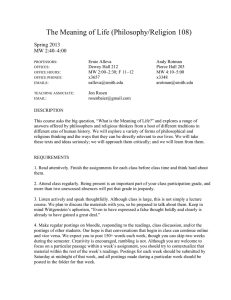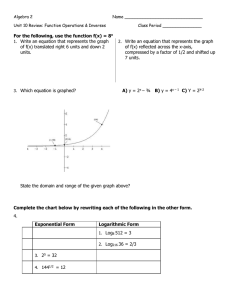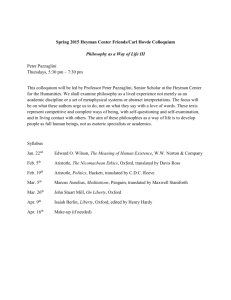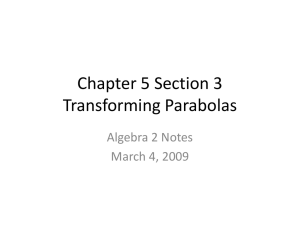The Meaning of Life (Philosophy/Religion 108) Fall 2005 MW 2:40-4:00
advertisement
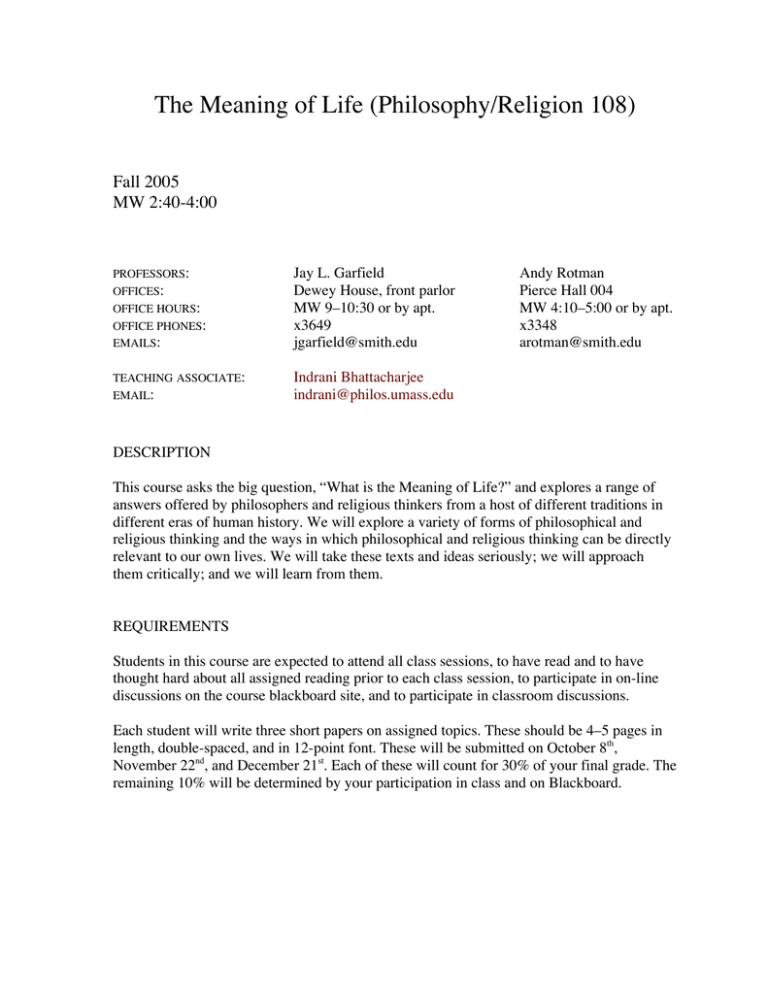
The Meaning of Life (Philosophy/Religion 108) Fall 2005 MW 2:40-4:00 PROFESSORS: OFFICES: OFFICE HOURS: OFFICE PHONES: EMAILS: Jay L. Garfield Dewey House, front parlor MW 9–10:30 or by apt. x3649 jgarfield@smith.edu TEACHING ASSOCIATE: EMAIL: Indrani Bhattacharjee indrani@philos.umass.edu Andy Rotman Pierce Hall 004 MW 4:10–5:00 or by apt. x3348 arotman@smith.edu DESCRIPTION This course asks the big question, “What is the Meaning of Life?” and explores a range of answers offered by philosophers and religious thinkers from a host of different traditions in different eras of human history. We will explore a variety of forms of philosophical and religious thinking and the ways in which philosophical and religious thinking can be directly relevant to our own lives. We will take these texts and ideas seriously; we will approach them critically; and we will learn from them. REQUIREMENTS Students in this course are expected to attend all class sessions, to have read and to have thought hard about all assigned reading prior to each class session, to participate in on-line discussions on the course blackboard site, and to participate in classroom discussions. Each student will write three short papers on assigned topics. These should be 4–5 pages in length, double-spaced, and in 12-point font. These will be submitted on October 8th, November 22nd, and December 21st. Each of these will count for 30% of your final grade. The remaining 10% will be determined by your participation in class and on Blackboard. 2 REQUIRED READING The Bhagavad Gita. Translated by Barbara Stoller Miller. Penguin Books, 2000. Nicomachean Ethics of Aristotle. Translated, with an introduction and notes, by Martin Ostwald. Upper Saddle River, NJ: Prentice Hall, 1999. Marcus Aurelius, The Meditations. Translated by G. M. A. Grube. Hackett Publishing Company, 1983. Leo Tolstoy, The Death of Ivan Ilyich. Translated by Lynn Solotaroff. New York & Toronto: Bantam books, 1981. Li-Young Lee, Book of My Nights: Poems. Poems. Rochester, NY: BOA Editions, 2001. Hannah Arendt, Eichmann in Jerusalem: A Report on the Banality of Evil. New York, NY: Penguin Books, 1994. H. H. Dalai Lama XIV, Ethics for the New Millennium. New York: Riverhead Books, 1999. John Coltrane, A Love Supreme. Impulse Records, 1964 & 1965. Source Book. (=SB) •texts are available at Grécourt Bookshop, 585–4140 •the source book is available at Paradise Copies, 30 Crafts Avenue, 585–0414 3 SYLLABUS WEEK 1 (9/12, 9/14) i. INTRODUCTION ii. When Should One Fight? •J. A. B. van Buitenen, trans. The Mahabharata: 1, The Book of the Beginning. Chicago and London: The University of Chicago Press, 1973. “The Mahabharata Introduction: The Central Story,” pp. xiii–xvi (SB) •Barbara Stoller Miller, trans. The Bhagavad Gita. Penguin Books, 1986. “Introduction—The Bhagavad Gita: Context and Text,” pp. 1–13 The First Teaching–The Second Teaching, pp. 21–39 SUPPLEMENTARY READINGS •R. C. Zaehner, trans. The Bhagavad Gita. New York: Oxford University Press, 1973. chapter introductions (SB) NOTE: You will find it helpful to read these chapter introductions along with each of the Teachings in Miller’s translation. For example, read Zaehner (pp. 120–121) and then Miller’s translation of The Second Teaching (pp. 29–39). WEEK 2 (9/19, 9/21) i. How Should One Act? •Barbara Stoller Miller, trans. The Bhagavad Gita. Penguin Books, 1986. The Third Teaching–The Ninth Teaching, pp. 41–87 ii. What Should One Think? •Barbara Stoller Miller, trans. The Bhagavad Gita. Penguin Books, 1986. The Tenth Teaching–The Eighteenth Teaching, pp. 89–154 WEEK 3 (9/26, 9/28) i. What Is Human Happiness? •Nicomachean Ethics of Aristotle. Translated, with an introduction and notes, by Martin Ostwald. Upper Saddle River, NJ: Prentice Hall, 1999. Book I, pp. 3–32 ii. What Is Goodness? •Nicomachean Ethics of Aristotle. Translated, with an introduction and notes, by Martin Ostwald. Upper Saddle River, NJ: Prentice Hall, 1999. Books II–IV, pp. 33–110 NOTE: topic for first paper distributed 4 WEEK 4 (10/3, 10/5) i. What Is The Good Life? •Nicomachean Ethics of Aristotle. Translated, with an introduction and notes, by Martin Ostwald. Upper Saddle River, NJ: Prentice Hall, 1999. Books VII–VIII, pp. 174–244 ii. Why Do Bad Things Happen To Good People? (guest lecture by Joel Kaminsky) •The HarperCollins Study Bible: New Revised Standard Version with the Apocrypha/ Deuterocanonical Books. General editor, Wayne A. Meeks. Associated Editors, Jouette M. Bassler, et al. San Francisco: Harper San Francisco, 1993. The Book of Job (SB) 10/7: first paper due WEEK 5 (10/10, 10/12) i. NO CLASS—Fall Break ii. How Does One Master Oneself? •Marcus Aurelius, The Meditations. Translated by G. M. A. Grube. Hackett Publishing Company, 1983. entire book WEEK 6 (10/17, 10/19) i. What Is The Way To Live? •Laozi, The Daodejing [a.k.a. Lao Tzu, Tao Te Ching]. In Readings in Classical Chinese Philosophy. Edited by Philip J. Ivanhoe and Bryan W. Van Norden. NewYork: Seven Bridges Press, 2001. entire book, pp. 157–202 (SB) NOTE: also available as an electronic resource from the library catalogue •Zhuangzi [a.k.a. Chuang Tzu]. In Readings in Classical Chinese Philosophy. Edited by Philip J. Ivanhoe and Bryan W. Van Norden. NewYork: Seven Bridges Press, 2001. excerpts, pp. 217–221, 234–235, 237–240, 243 (ch. 26) (SB) NOTE: also available as an electronic resource from the library catalogue ii. How Does One Connect With God? •Nizam ad-din Awliya, Morals for the Heart. Translated by Bruce B. Lawrence. Introduction by Khaliq A. Nizami. New York: Paulist Press, 1992. Excerpts, pp. 3–15, 132–142, 173–184, 312–314 (SB) •Carl Ernst. In Religions of India in Practice. Edited by Donald S. Lopez. Princeton: Princeton University Press, 1995. “Conversations with Sufi Saints,” pp. 513–517 (SB) 5 WEEK 7 (10/24, 10/26) i. How Does One Experience God? •Symeon the New Theologian: The Discourses. Translation by C. J. de Catanzaro. Introduced by George Maloney; preface by Basile Krivocheine. New York: Paulist Press, 1980. Excerpts, xvii, 41–59, 109–111, 143–149 (SB) ii. What Is Enlightenment? •Immanuel Kant, Perpetual Peace and Other Essays on Politics, History, and Morals. Translated with an introduction by Ted Humphrey. Indianapolis: Hackett Publishing Company, 1983. “An Answer to the Question: What is Enlightenment?” 41–48 (SB) WEEK 8 (10/31, 11/2) i. What Is Left Of It? •Friedrich Nietzsche, Twilight of the Idols. Translated, with and Introduction and Commentary, by R. J. Hollingdale. Penguin Book, 1968. Introduction, 7–17 (SB) Excerpts, pp. 23–59, 85–96 (SB) NOTE: The translation by Duncan Large is available as an electronic resource from the library catalogue. ii. What Does My Death Mean? •Leo Tolstoy, The Death of Ivan Ilyich. Translated by Lynn Solotaroff. New York & Toronto: Bantam books, 1981. complete story, pp. 35–134 NOTE: The translation by Louise and Aylmer Maude is available online at http://www.geocities.com/short_stories_page/tolstoydeath.html. WEEK 9 (11/7, 11/9) i. What Is Truth? •Dalton, Dennis, ed. Mahatma Gandhi: Selected Political Writings. Indianapolis and Cambridge: Hackett Publishing Company, Inc., 1996. “Introduction,” 3–25 (SB) “Part 1: Satyagraha: The Power of Nonviolence,” 29–64, 81–91 (SB) NOTE: topic for second paper distributed ii. What Is This World? •Li-Young Lee, Book of My Nights: Poems. Poems. Rochester, NY: BOA Editions, 2001. entire book 6 WEEK 10 (11/14, 11/16) i. What Is Evil? •Hannah Arendt, Eichmann in Jerusalem: A Report on the Banality of Evil. New York, NY: Penguin Books, 1994. Excerpts, pp. 3–67, 83–111 ii. How Abnormal Is Serious Evil? •Hannah Arendt, Eichmann in Jerusalem: A Report on the Banality of Evil. New York, NY: Penguin Books, 1994. Excerpts, pp. 112–150, 220–298 WEEK 11 (11/21, 11/23) i. What Does It All Mean? SCREENING: I Heart Huckabees. Directed by David O. Russell. Written by David O. Russell and Jeff Baena. 106 minutes. 2004. NOTE: second paper due ii. NO CLASS—Thanksgiving Break WEEK 12 (11/28, 11/30) i. How Does One Live With Compassion? •H. H. Dalai Lama XIV, Ethics for the New Millennium. New York: Riverhead Books, 1999. Chapters 1–8, pp. 3–131 ii. How Does One Live With Compassion? •H. H. Dalai Lama XIV, Ethics for the New Millennium. New York: Riverhead Books, 1999. Chapters 9–16, pp. 133–237 WEEK 13 (12/5, 12/7) i. How Does One See the Divine? •John Fire/Lame Deer and Richard Erdoes, Lame Deer: Seeker of Visions. New York, Simon and Schuster, 1972. Chapters 1, 3, 7, 9, pp. 11–17, 42–71, 119–138, 154–173 (SB) NOTE: topic for third paper distributed ii. What Is Supreme Love? •John Coltrane, A Love Supreme. Impulse Records, 1964 & 1965. NOTE: Listen repeatedly! •Ashley, Kahn, A Love Supreme: The Story of John Coltrane’s Signature Album. Penguin Books, 2002. “Poetry and Prayer, 144–147 (SB) 7 WEEK 14 (12/12, 12,14) i. NO CLASS SCREENING OUTSIDE OF CLASS: The Seven Samurai (Shichinin no samurai). Directed by Akira Kurosawa. Written by Akira Kurosawa, Shinobu Hashimoto, and Hideo Oguni. 203 minutes. 1954. NOTE: time and place to be announced ii. What Is The Meaning Of Life? discussion of The Seven Samurai 12/22: third paper due
